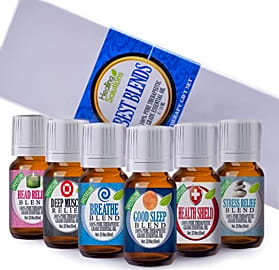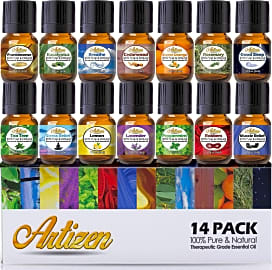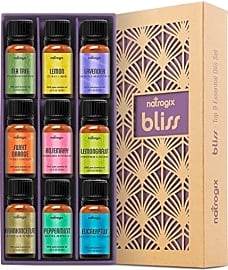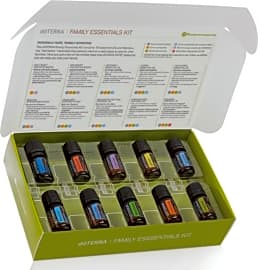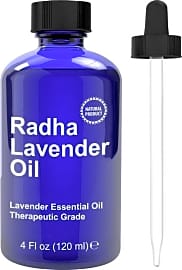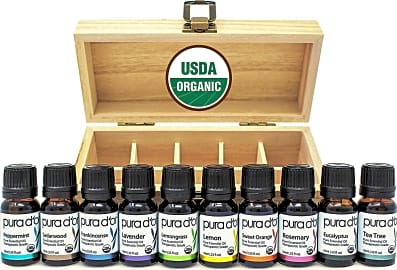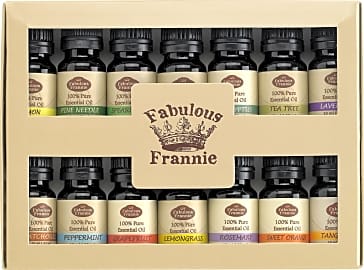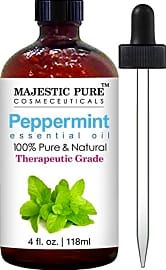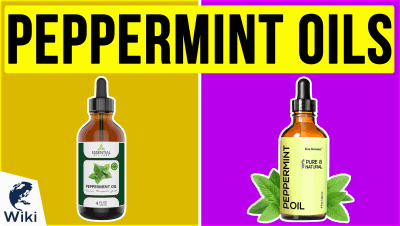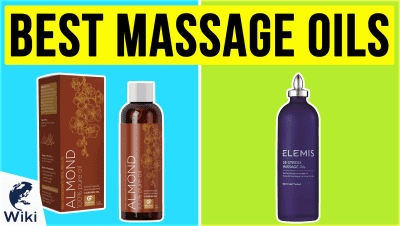The 10 Best Essential Oils

This wiki has been updated 42 times since it was first published in March of 2015. Claiming a vast array of benefits, essential oils are quickly becoming, well, essential, to a significant number of people. The varied selections on this list are certain to make your space smell more inviting, if not calm your nerves. Regardless of whether you're a true believer in homeopathic wellness or are just sniffing around, you're likely to find a suitable option here for your needs. When users buy our independently chosen editorial recommendations, we may earn commissions to help fund the Wiki.
Editor's Notes
March 27, 2020:
Essential oils are plant extracts combined with a carrier oil, and they can be used in many ways. Most are safe to apply to the skin, so it's no wonder celebrities have been choosing in greater numbers to wear these recognizable fragrances in place of perfumes, which often contain artificial ingredients. While we would stop short of recommending essential oils for their purported medicinal properties, some users report that certain scents, like peppermint, for example, can have a beneficial effect on common maladies like headaches, nausea, stress, and depression. Citrus fragrances — citronella in particular — have long been recognized for their natural bug-repellant properties.
They can also help you keep your home smelling fresh. There are options in this list that come in spray bottle containers that make it easy to spritz over furniture. If you want your whole room or home to smell like your favorite herb or citrus fruit, an oil diffuser may be a necessary investment. There are also small diffusers on the market designed specifically for travel, so you can throw those overpowering, artificial-smelling air fresheners away for good.
The following formulas and sets are new to the list: the Lagunamoon Top 6, Artizen Aromatherapy Therapeutic, Radha Beauty Lavender, and Pura D'Or Perfect 10. Due to availability concerns and quality complaints the Edens Garden Supreme, Kis Oils Top 6, ArtNaturals Top 8, and Healing Solutions Family Doctor have gotten the ax.
Special Honors
Homesick Summer Camp Get back in touch with the child within by dabbing a few drops of this specially designed blend on your wrists or behind your ears. You'll be sent down memory lane thanks to strong (but not overwhelming) notes of grass, smoke, and sunscreen. Soothing amber and citrus are also in the mix. homesick.com
West Elm Vitruvi These oils are gentle enough to be mixed in with your favorite face lotion or serum, and the scents are pleasant and delicate — unlikely to give you a headache. They're also compatible with virtually every diffuser on the market. Each bottle contains .3 fluid ounces of product. westelm.com
Happy Spritz Spray If you're looking for sophisticated essential oil blends, Happy Spritz may be what you have in mind. There are multiple fragrances to choose from, including options featuring favorites like peppermint, eucalyptus, and chamomile. Plus, the packaging is recyclable. anthropologie.com
Essential Oils: Modern Ancient Medicine
The oils created are readily absorbed into the bloodstream via inhalation or diffusion through the skin.
Throughout all of written history, humans have been using various plants for medicinal purposes. Contemporary medicine builds off of ancient plant wisdom to create many pharmaceutical drugs. While chemical medicine creates likenesses of the beneficial compounds in plants; unadulterated essential oils provide safe and effective ways to increase the uptake of the actual beneficial compounds into the human body.
While essential oils have risen to popularity in the modern era, phytotherapy is as old as humanity itself. The study of natural compounds and extracts used as medicine is found in every culture in history, and evidence of phytotherapy in practice dates back to as early as 3500 B.C.E. Much of the extraction of medically beneficial compounds from plants and their parts was done using simple methods such as hydrodiffusion, vaporization, decoction, and the use of basic solvents.
As chemical medications took hold in the 20th century, plant medicines were nearly eliminated from use in western practices. This was due to the fact that the potency of chemical medicines made from plants varied greatly based on the drying and extraction method used on the plants themselves. This sort of variation was unacceptable in such an exacting practice.
Essential oils capture the biological medicines of plants in a way that is very appealing to western society. Modern essential oils are extracted though a variety of methods, though whichever is best-suited to isolating the greatest amount of pharmacological compounds within the plant tends to become a standard practice. The oils created are readily absorbed into the bloodstream via inhalation or diffusion through the skin. Most of the beneficial particles in essential oils can even cross the blood/brain barrier to positively affect the brain.
How Essential Oils Enter the Body
After certain plants are processed through the various extraction methods available, a high concentration of potent medicinal compounds are produced. This makes essential oils a more viable medical option than the plants themselves, as it often takes a large amount of plant matter to create even 10ml of pure essential oil. Because of the fat solubility of many essential oils, they are quickly absorbed into the human body, and easily delivered to all cells.
Thanks to the power of the heart, essential oils can circulate the entire body in minutes.
There are three ways in which essential oils enter the body: orally, topically, and aromatically. Due to the high antioxidant properties of a great number of essential oils, oral administration is only carried out under direct guidance from a healthcare practitioner to treat very serious conditions. Compounds in the oils can cause some serious side-effects if incorrectly ingested.
Luckily, the large number of compounds in essential oils are readily picked up by the capillaries in the lungs and skin cells; meaning that oils are easily introduced into the body by an aromatherapy diffuser or topical application.
When inhaled, the medicinal compounds in the oils are absorbed by the lungs and transported to the bloodstream in much the same way that oxygen is. Thanks to the power of the heart, essential oils can circulate the entire body in minutes. Upon entering the bloodstream, the compounds interact with blood cells and body tissues to produce very beneficial results, such as removing toxins like nitric oxide from the blood, reducing tumor sizes, even positively affecting the mood.
The action of essential oils remains much the same with topical application. This is due to the relative permeability of the skin. The skin is the largest organ of the integumentary system, and can act like a sponge to certain compounds. In fact, studies have shown that the ability of the skin to absorb volatile compounds is actually quite high. While this is an unfavorable trait for a body in a pool full of chlorine, it is quite useful with essential oils. Pure essential oils and oils diluted in a carrier oil and applied to the skin can safely carry medicinal compounds into the bloodstream.
How Essential Oils Affect The Body
There are many volatile medicinal compounds in plants, and many uses for them. The fresh, sharp scent of a bruised peppermint leaf is one example; the scent it releases is the powerful compound menthol, which provides many health benefits.
The use of aromatherapy enhances the parasympathetic nervous system, significantly decreasing heart rate and blood pressure.
The goal of western medicine is to have a "pill for every ill". While this may seem like a utopian thought to some, chemical medicines often have their own list of associated side effects. Because essential oils are naturally occurring, there is a much smaller chance for them to cause reactions in the body.
An obvious exception to this rule is when certain plants generate an allergic reaction to the user; it is not advisable to use that specific essential oil. Some essential oils can also cause allergic reactions when used undiluted on the skin. It's always good practice to perform a skin reaction test, by applying a small amount of oil to the skin's surface and observing any changes over the course of fifteen minutes.
When used properly, there is a long list of benefits of essential oils to the body, including reducing inflammation, improving brain function, and even protecting the heart from the damages of stress. Researchers have found that school workers who are exposed to a diffusion of essential oils show less markers of stress than control groups. The use of aromatherapy enhances the parasympathetic nervous system, significantly decreasing heart rate and blood pressure. These are just a few of the many beneficial ways that essential oils can affect the body.


